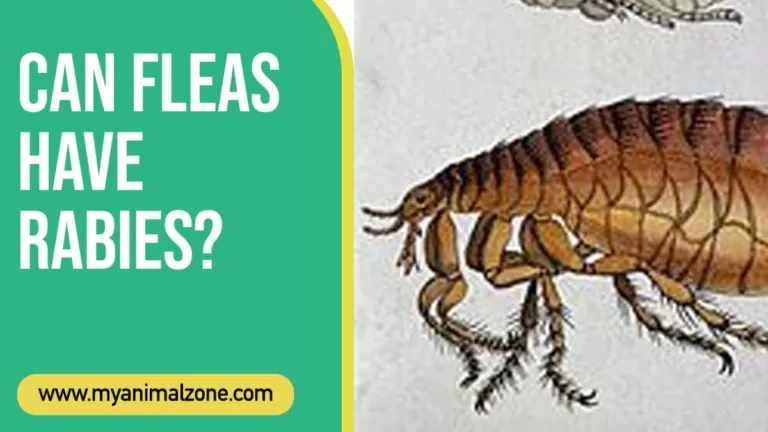This article will teach about fleas’ potential dangers and how to protect yourself and your pet. So the question is Can fleas have rabies? For starters, fleas are parasites that feed on the blood of their hosts and can transmit diseases like murine typhus, plague, and myxomatosis. They can even spread certain viruses known to cause rabies in humans or animals.
Rabies is a severe and potentially deadly virus commonly spread by animal bites. Rabies is a zoonotic virus that passes from animals to humans and vice versa. While fleas are not considered the primary vector for rabies transmission, they can transmit the virus.
Fleas are tiny insects that feed on the blood of mammals. They can’t fly but can jump long distances — up to two feet at a time — and often transmit diseases by their bites. For example, fleas typically cannot become infected with Rabies because their bodies cannot support the virus; however, if an animal or human carrying rabies comes into contact with a flea, the flea may pick up the virus from its host’s saliva or blood, and then transmit it to another person in its next bite.
One should also note that while fleas are not known to carry Rabies specifically, they can still transmit other viruses, such as Bartonella species (cat scratch disease) or Yersinia pestis (plague), which can result in illness in humans if left untreated. Therefore, any potential flea bite should be taken seriously by consulting your doctor immediately if you believe you have been exposed to any infection through flea contact.
Fleas are usually about 1/16th of an inch in length, although certain kinds may be smaller or larger than this. Recognizable by their reddish-brown coloring and small oval shape, fleas have segmented bodies with three pairs of legs designed for superior jumping ability (enabling them to reach heights of several feet). Fleas also have piercing mouthparts that they use to feed on their hosts’ blood and a rigid exoskeleton that protects them from water loss, allowing them to survive prolonged periods without food or water.
Although fleas don’t carry the rabies virus directly, they are known to transmit infected blood when biting an animal carrying the virus, such as a bat or skunk. Rabid animals may become more attractive feeding sources for fleas due to their impaired senses of smell and movement due to rabies symptoms; however, direct transmission of Rabies from one infected animal to another is scarce. Therefore, the best way to protect your pet from becoming rabid is through regular vaccinations administered by your veterinarian.
What are Rabies?
Rabies is a viral disease spread to humans by biting an infected animal, such as a raccoon, bat, fox, or another mammal. The virus travels to the central nervous system by incubating in muscle tissue before appearing in the spinal fluid, from where it spreads rapidly throughout the body. Symptoms can include fever, headache, and weakness, but it is almost always fatal once symptoms appear.
Fleas are not known to host or transmit Rabies; no evidence suggests fleas can spread or contract Rabies. However, cleaning pet bedding regularly and taking preventive measures against fleas and other parasites for your pet can help significantly reduce the health risks posed by parasites in general.
Can Fleas Contract Rabies?
The potential for an animal such as a flea to contract Rabies is a much-debated topic in scientific and veterinary communities. As of yet, there is no scientific evidence that suggests that fleas are capable of acquiring and transmitting the rabies virus.
Like many viral diseases, Rabies requires specific bodily tissues and nerve structures to replicate and transmit between living organisms. Fleas, although they have nervous systems, do not have a structure similar enough to humans to enable the rabies virus to infect them or be passed on through biting.
However, because there is limited research into this area, fleas could theoretically transmit the disease from one infected host to another through some unknown mechanism. In any case, it would be scarce for such an event to occur, and there is no evidence of confirmed instances yet. Therefore, to ensure your pet’s safety from rabid animals in your area, consult with your local veterinarian about possible vaccinations against Rabies or other contagious diseases before exposing your pet or yourself to any potential risks.
Potential Sources of Rabies for Fleas
While fleas are unlikely to carry Rabies, other animals can expose them to it. Fleas primarily feed on the blood of wild and domestic animals, including birds and rodents, by living inside their fur or feathers. These animals may have been exposed to and infected with the rabies virus from other sources, such as bats, skunks, raccoons, and foxes which commonly carry the virus. Fleas can also transmit the rabies virus indirectly by biting an animal whose blood is contaminated before being released into its environment.
Flea-borne Rabies typically does not cause visible symptoms in infected fleas; therefore, there is no quick way to identify a flea as carrying the virus without laboratory tests. Although rare, if a rabid flea bites a person or pet, they risk becoming infected with the virus. Therefore, rabies prevention is essential; all mammals that require protection from Rabies (such as dogs, cats, and livestock) should be up to date with their vaccinations against this disease.
Risk of Rabies Transmission from Fleas
The occurrence of Rabies in fleas is infrequent, but it is essential to understand the potential transmission risks. For example, fleas serve as intermediate hosts for specific strain variants of the rabies virus. They have been implicated in human epidemics due to their ability to carry the virus from one mammal to another.
While direct transmission from flea-to-human contact is considered rare and unlikely, it is still possible, especially in cases where an infected animal bites a human or comes into contact with a human with exposed skin or a cut or wound. It is also possible that a bite by an infected flea could transmit Rabies.
Due to their complex feeding habits and wide range of mammalian hosts, fleas may acquire the rabies virus if they feed on an infected host animal which could transmit Rabies to other mammals that get bitten or scratched by the same flea species. Furthermore, people should avoid contact with wild animals or any unknown animal sources due to potential infection from zoonotic diseases such as Rabies.
Because evidence linking direct transmission from humans infected with Rabies through a flea bite is limited and rare, health professionals advise seeking medical attention immediately if there has been any direct contact between humans and wild animals that are known carriers of this deadly infection.
Prevention and Treatment of Rabies
Rabies is a deadly virus transmitted through an infected animal’s saliva, typically through a bite. Although it is rare for fleas to transmit Rabies, it is still important to practice preventive measures when dealing with fleas and other wildlife. This includes avoiding contact with nature, properly vaccinating animals against the virus, and seeking immediate medical attention if you believe a wild or unfamiliar animal has bitten you.
In treating existing infestations, fleas can be prevented and managed with regular yard treatments and proper pet care. Common preventative treatments include sprays and debris removal, while treating existing flea infestations may require medication administered by a veterinarian.
It is important to note that there currently is no cure for rabies infection in humans or animals once symptoms start showing. With this in mind, prevention and prompt medical attention should be your first defense if you think you may have been bitten by an animal suspected of carrying Rabies.
In conclusion, it is doubtful for fleas to transmit Rabies because they do not typically come into contact with the saliva of a rabid animal. Instead, fleas feed on the blood of warm-blooded animals, and while they may come into contact with an infected animal, carrying Rabies is not part of their natural cycle.
To be cautious, you should still avoid contact with wild or stray animals, including their fleas. However, it is essential to remember that all mammals are susceptible to Rabies, and one must handle and treat appropriately if any signs or symptoms develop.
Final Words
Can fleas have rabies? The answer to this question is an emphatic no. Fleas are not susceptible to the rabies virus and, therefore, cannot become infected. However, they can act as vectors for diseases like Lyme disease and plague. Remembering that fleas can transmit diseases to animals is important, so if your pet has fleas, you should reduce the risk of infection. Additionally, regularly check your pets for signs of disease and consult with a vet as necessary. Taking these precautions will help keep your pet healthy and safe.




